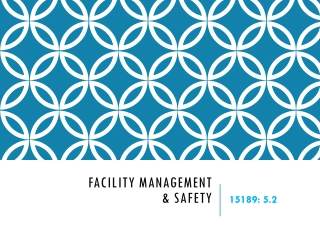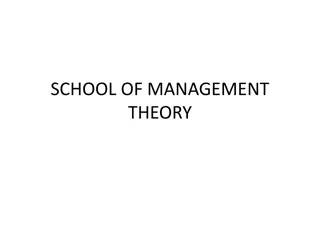
Essential Insights on Management Characteristics and Levels
Gain a comprehensive understanding of management, its definition, characteristics such as universality and goal orientation, and the importance of different levels of management in organizational success. Explore the dynamic nature of management as a continuous, multi-dimensional process that guides group activities towards achieving common goals efficiently.
Download Presentation

Please find below an Image/Link to download the presentation.
The content on the website is provided AS IS for your information and personal use only. It may not be sold, licensed, or shared on other websites without obtaining consent from the author. If you encounter any issues during the download, it is possible that the publisher has removed the file from their server.
You are allowed to download the files provided on this website for personal or commercial use, subject to the condition that they are used lawfully. All files are the property of their respective owners.
The content on the website is provided AS IS for your information and personal use only. It may not be sold, licensed, or shared on other websites without obtaining consent from the author.
E N D
Presentation Transcript
BUSINESS MANAGEMENT MANAGEMENT
Definition of Management Management can be defined as the process of administering and controlling the affairs of the organization, irrespective of its nature, type, structure and size. It is an act of creating and maintaining such a business environment, wherein the members of the organization can work together, and achieve business objectives efficiently and effectively. Management acts as a guide to a group of people working in the organization and coordinating their efforts, towards the attainment of the common objective. In other words, it is concerned with optimally using 5M s, i.e. men, machine, material, money and methods and, this is possible only when there proper direction, coordination and integration of the processes and activities, to achieve the desired results.
Characteristics of management characteristics of management
Characteristics of management Universal: All the organizations, whether it is profit-making or not, they require management, for managing their activities. Hence it is universal in nature. Goal-Oriented: Every organization is set up with a predetermined objective and management helps in reaching those goals timely, and smoothly. Continuous Process: It is an ongoing process which tends to persist as long as the organization exists. It is required in every sphere of the organization whether it is production, human resource, finance or marketing.
Characteristics of management Group activity: An organization consists of various members who have different needs, expectations and beliefs. Every person joins the organization with a different motive, but after becoming a part of the organization they work for achieving the same goal. It requires supervision, teamwork and coordination, and in this way, management comes into the picture. Dynamic function: An organization exists in a business environment that has various factors like social, political, legal, technological and economic. A slight change in any of these factors will affect the organization s growth and performance. So, to overcome these changes management formulates strategies and implements them.
Characteristics of management Intangible force: Management can neither be seen nor touched but one can feel its existence, in the way the organization functions. Precisely, all the functions, activities and processes of the organization are interconnected to one another. And it is the task of the management to bring them together in such a way that they help in reaching the intended result. Multi-dimensional: Management is not confined to the administration of people only, but it also manages work, processes and operations, which makes it a multi- disciplinary activity.
LEVELS OF MANAGEMENT Top-Level Management: This is the highest level in the organizational hierarchy, which includes Board of Directors and Chief Executives. They are responsible for defining the objectives, formulating plans, strategies and policies. Middle-Level Management: It is the second and most important level in the corporate ladder, as it creates a link between the top and lower-level management. It includes departmental and division heads and managers who are responsible for implementing and controlling plans and strategies which are formulated by the top executives. Lower Level Management: Otherwise called as functional or operational level management. It includes first- line managers, foreman, supervisors. As lower-level management directly interacts with the workers, it plays a crucial role in the organization because it helps in reducing wastage and idle time of the workers, improving the quality and quantity of output.






















